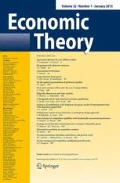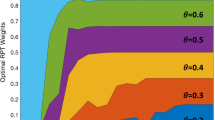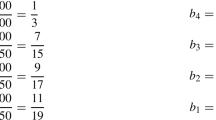Abstract
Users share the cost of unreliable non-rival projects (items). For instance, industry partners pay today for R&D that may or may not deliver a cure to some viruses, agents pay for the edges of a network that will cover their connectivity needs, but the edges may fail, etc. Each user has a binary inelastic need that is served if and only if certain subsets of items are actually functioning. We ask how should the cost be divided when individual needs are heterogenous. We impose three powerful separability properties: Independence of Timing ensures that the cost shares computed ex ante are the expectation, over the random realization of the projects, of shares computed ex post. Cost Additivity together with Separability Across Projects ensure that the cost shares of an item depend only upon the service provided by that item for a given realization of all other items. Combining these with fair bounds on the liability of agents with more or less flexible needs, and of agents for whom an item is either indispensable or useless, we characterize two rules: the Ex Post Service rule is the expectation of the equal division of costs between the agents who end up served; the Needs Priority rule splits the cost first between those agents for whom an item is critical ex post, or if there are no such agents between those who end up being served.
Similar content being viewed by others
Notes
Recall that no closed form expression of the number of inclusion-monotonic subsets of \(2^{A}\) is known.
By contrast, Wicksell’s “benefit principle” is generally abandoned for the taxation of “macro”-public services, because of its pervasive regressivity.
We call \(D\in {\mathcal {D}}^{i}\) minimal if \(D\diagdown \{a\}\notin {\mathcal {D}}^{i}\) for all \(a\in D\).
It is easy to see that this model encompasses our model: Ay cost allocation problem in Definition 1 can be written as a virus problem for an appropriate choice of V and \(T_{i}\).
Two projects a, b enter symmetrically in Q if each service constraint \( {\mathcal {D}}^{i}\) is invariant by the operation in \(2^{A}\) switching a and b (if X contains one and not the other, exchange them in X; otherwise do nothing).
Since Ann’s ex ante probability of being served is 1, and Chris’ is 0.9 we get \(\widetilde{y}^{xa}=(0.53,0.47)c_{A}\). Under the ex post rule if a works but b fails Ann and Bob share equally, while if b works but a fails only Ann is liable: so \(\widetilde{y}^{xp}=(0.55,0.45)c_{A}\).
We could of course define the axioms for global cost shares, under the assumption that all items except a are costless.
References
Aumann, R.J., Maschler, M.: Game theoretic analysis of a bankruptcy problem from the Talmud. J. Econ. Theory 36, 195–213 (1985)
Ball, M.O.: Computing network reliability. Oper. Res. 27, 832–838 (1979)
Bogomolnaia, A., Moulin, H.: Sharing a minimal cost spanning tree: beyond the Folk solution. Games Econ. Behav. 69, 238–248 (2010)
Bergantinos, G., Martinez, R.: Cost allocation in asymmetric trees. Eur. J. Oper. Res. 237, 975–987 (2014)
Ertemel, S., Kumar, R.: Ex ante versus ex post proportional rules for state contingent claims, manuscript (2014)
Gomez-Rua, M., Vidal-Puga, J.D.: A monotonic and merger-proof rule in minimum cost spanning tree situations. Econ. Theory (2016). doi:10.1007/s00199-016-0996-x
Habis, H., Herings, P.J.J.: Stochastic bankruptcy games. Int. J. Game Theory 42, 973–988 (2013)
Hougaard, J.L.: An Introduction to Allocation Rules. Springer, Berlin (2009)
Hougaard, J.L., Moulin, H.: Sharing the cost of redundant projects. Games Econ. Behav. 87, 339–352 (2014)
Hougaard, J.L., Moulin, H., Østerdal, L.P.: Decentralized pricing in minimum cost spanning trees. Econ. Theor. 44, 293–306 (2010)
Hougaard, J.L., Tvede, M.: Minimum cost connection networks: truth-telling and implementation. J. Econ. Theory 157, 76–99 (2015)
Julian, D., Chiang, M., O’Neill, D., Boyd, S.: QoS and fairness constraints convex optimization of resource allocation for wireless cellular and ad hoc networks. In: IEEE INFOCOM 2002 (2002)
Moulin, H.: Axiomatic cost and surplus sharing, Ch. 6. In: Handbook of Social Choice and Welfare (Vol. 1), Edited by Arrow, Sen and Suzumura, Elsevier (2002)
Moulin, H., Laigret, F.: Equal-need sharing of a network under connectivity contraints. Games Econ. Behav. 72, 314–320 (2011)
Moulin, H., Shenker, S.: Strategyproof sharing of submodular costs: budget balance versus efficiency. Econ. Theor. 18, 511–533 (2001)
Myerson, R.B.: Utilitarianism, egalitarianism, and the timing effect in social choice problems. Econometrica 49, 883–897 (1981)
Neely, M.J., Modiano, E., Li, C.-P.: Fairness and optimal stochastic control for heterogeneous networks. IEEE/ACM Trans. Netw. 16, 396–409 (2008)
O’Neill, B.: A problem of rights arbiration from the Talmud. Math. Soc. Sci. 2, 345–371 (1982)
Thomson, W.: Axiomatic and game-theoretic analysis of bankruptcy and taxation problems: An update. Math. Soc. Sci. 74, 41–59 (2015)
Thomson, W.: Cost Allocation and Airport Problems. University of Rochester WP 538 (2007)
Xue, J.: Fair Division with Random Demands, Mimeo. Singapore Management University (2014)
Acknowledgements
Support by the Basic Research Program of the National Research University Higher School of Economics is gratefully acknowledged.
Author information
Authors and Affiliations
Corresponding author
Rights and permissions
About this article
Cite this article
Hougaard, J.L., Moulin, H. Sharing the cost of risky projects. Econ Theory 65, 663–679 (2018). https://doi.org/10.1007/s00199-017-1034-3
Received:
Accepted:
Published:
Issue Date:
DOI: https://doi.org/10.1007/s00199-017-1034-3




